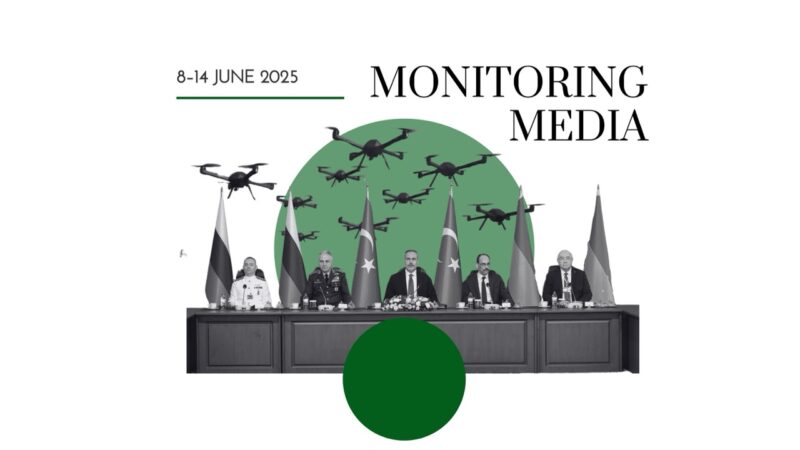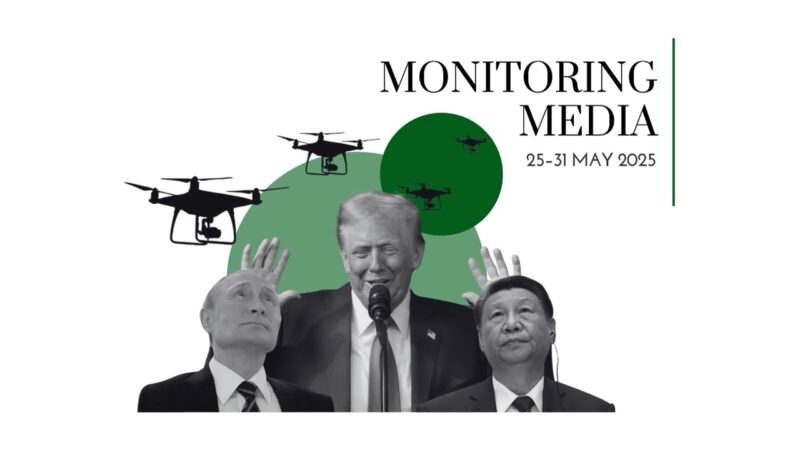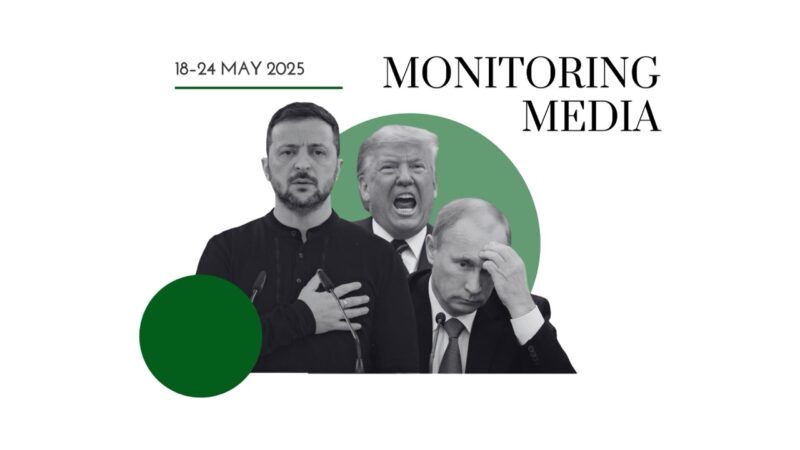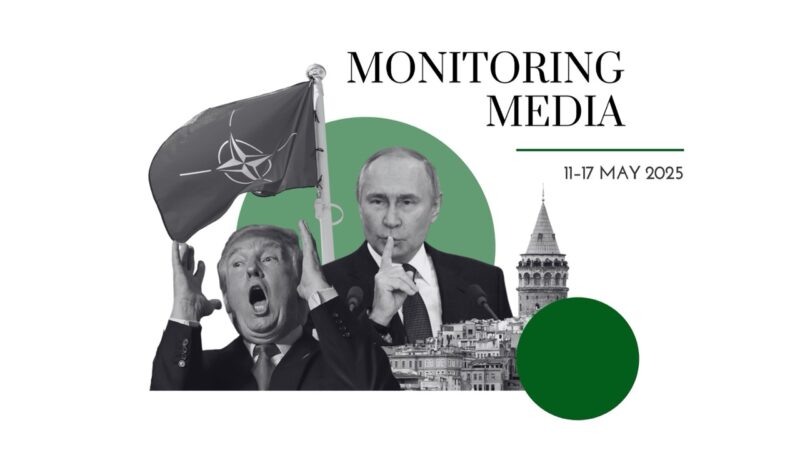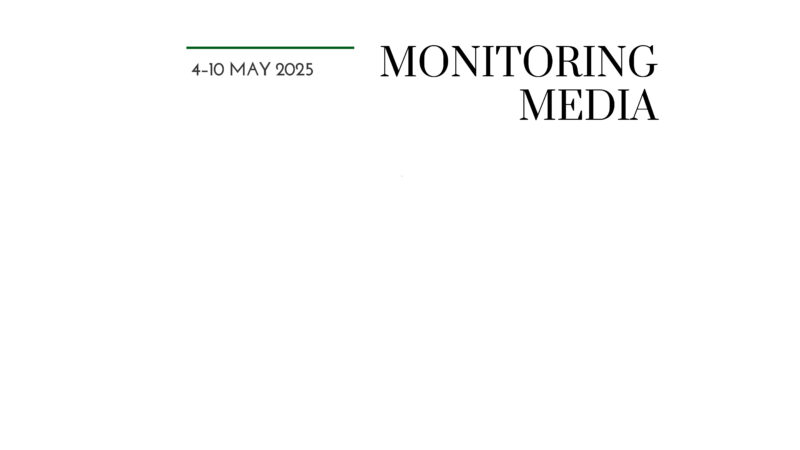The West should increase its support and secure Ukraine’s victory

CIUS weekly report on media coverage of Ukrainian affairs, 14–20 January 2023
Three publications (The Atlantic, Atlantic Council, and The National Interest) were selected to prepare this report on how the situation in Ukraine has been portrayed in the press during the past week (14–20 January 2023). The sample was compiled based on their impact on public opinion as well as on their professional reputation, popularity among the readership, and topical relevance. These three publications represent centrist and conservative viewpoints on the political spectrum.
This report covers only the most-read and relevant articles about Ukraine, as ranked by the respective publications themselves in the past week. Its scope covers promoted articles on home pages and articles from special sections on Ukraine, with the hashtag #Ukraine, from the paper editions of the publications, and about Ukraine from opinion columns and editorials.
Topics featured in the selected articles:
- Ukraine’s current affairs: Ukraine is likely to defeat Russia if the Western support continues; Ukrainian female artists tell stories about the war to the US public;
- The world and Ukraine: Germany should send Leopard tanks to Ukraine and better align its policies with those of its transatlantic partners; the West should not be afraid of Russia’s threats to use a nuclear weapon, as this scenario is improbable; the West should actively use old and invent new mechanisms to support Ukraine; the Western support should be progressively increasing up to the point where Ukraine becomes equal in firepower with Russia.
Main arguments:
Ukraine will win the war if it continues receiving advanced weapons. Phillips Payson O’Brien (The Atlantic) writes that regardless of Ukraine’s numerous successes on the battlefield, one of the fundamental Western assumptions today is that “Ukraine has little hope of ultimate triumph over a fully mobilized Russia. In this account, the longer the war goes on, and the more rounds of forced conscription that Vladimir Putin and his military impose on the Russian population, the more decisive Russia’s supposed advantages will be.” O’Brien considers this assumption to be faulty, as Russia continues to be halted by logistical, planning, and organizational failures. The newly mobilized soldiers—allegedly Russia’s most recent trump card—are undertrained, suffer from low morale, and lack modern equipment. Not to mention that any huge unprofessional army driving Soviet-era tanks and vehicles will have difficulties winning a 21st-century war. O’Brien deduces that “Russia is not gathering its strength in a powerful new army. It is assembling an inferior version of the force with which it started the war.” At the same time, “although Ukraine has suffered substantial military losses and absorbed a series of attacks on civilian targets, its defensive capabilities keep improving.” The Western world got shocked by Russia’s atrocities on the occupied territories and decided to arm Ukraine better, gradually increasing the quantity and quality of supplied armaments. The final pieces of Western equipment that Ukraine still awaits are high-mobility armed vehicles and long-range artillery systems. O’Brien concludes that the new stage of war may become very bloody due to Russia’s desire to win at all costs, including the massive sacrifice of the newly mobilized soldiers. However, “Ukraine has most of the advantages that typically decide a war. Its forces will be better trained, better led, and, with the West’s help, far better armed. And most Ukrainians’ determination is likely to remain strong, in part because they don’t have any choice but to win.”
Ukrainian female art helps tell stories of suffering and war to Americans. Melinda Haring and Jacob Heilbrunn (Atlantic Council) wrote a review of a recent US exhibition, “Women at War.” They open their article with the statement that since “February 2022, Russia has pillaged over 30 museums, stealing thousands of precious objects, from oil paintings to ancient artifacts. These thefts … are not isolated episodes but part of a wider and premeditated effort by Russian President Vladimir Putin to destroy the culture of Ukraine.” In light of the Russian assault on Ukraine’s culture, “Women at War”—which features twelve female Ukrainian artists—sends a powerful signal that the plans of the aggressor are crumbling. The exhibition has recently moved from New York to Washington, where it will stay on Stanford University’s campus until 22 March 2023. The exhibition documents Russia’s atrocities in Ukraine as well as portrays the resilience of the local society against the invasion. It includes a seven-minute film by Oksana Chepelyk, Letter from Ukraine, political cartoons depicting the hellishness of daily life in the Donbas, drawings of victims of rape by Russian soldiers, a series of photographs of destroyed urban and industrial landscapes, a superb life-sized oil painting on canvas by Lesia Khomenko titled Max in the Army, and other works of art.
Germany should become a more proactive player in the Western alliance and send Leopard tanks to Ukraine. Jacob Heilbrunn (National Interest) looks into Germany’s policy on supporting Ukraine and reflects on the reluctance of Olaf Scholz’s government to send Leopard tanks and other heavy weaponry. Heilbrunn argues that “in confronting a new threat from Russia, Germany faces many of the same issues and sentiments that it once faced after World War II when it began to contemplate the creation of armed forces.” In particular, these include the pacifist mood across German society, which often provokes criticism of the entire concept of national armed forces, as well as the political tradition of cooperation with Russia, which is especially strong among Social Democrats. The new minister of defence, Boris Pistorius, has a challenging task ahead. He needs to not only convince German society of the necessity to support Ukraine and modernize the national army but also to embrace the gigantic task of the actual modernization and adjustment of the army to new security challenges. In turn, Scholz has to demonstrate political courage, similar to that shown by Conrad Adenauer in the 1950s, and deeply anchor Germany in the Western community. This will eventually lead to the severing of ties with Russia—appearing as a logical step toward a new-generation Zeitenwende policy, which Scholz proclaimed in February 2022. Heilbrunn concludes that “until now, Scholz’s coalition partners, the Free Democrats and the Greens, have been far more forthright than him about assisting Ukraine and assailing the Kremlin. Many in the Social Democratic Party cling to the notion that they can go back to the future—to the cozy ties that once existed between Moscow and Berlin. But the war crimes that Russian president Vladimir Putin has committed in Ukraine mean that this is a dangerous chimera. The time for Germany once again to go West has arrived.”
The West should not fall victim to Russian nuclear blackmail even when Ukraine starts liberating Crimea. Andriy Zagorodnyuk (Atlantic Council) writes that many actors in the West believe that Putin would authorize a nuclear strike if Ukraine’s forces ever enter the territory of Crimea. The Kremlin has reiterated numerous times that the peninsula is a part of its sovereignty. Overall, the Crimean annexation in 2014 is regarded in Russia—in symbolic and historical terms—as the epitome achievement of Putin’s 23-year reign. However, according to Zagorodnyuk, “in a war of aggression such as the current Russian invasion of Ukraine, crossing the nuclear threshold would result in potentially devastating costs while offering dubious strategic advantages.” Not to mention that Ukraine’s liberation of Kharkiv oblast and the city of Kherson did not trigger the ultimate response, as Putin had warned would happen. The up-to-date evidence suggests that the Kremlin is not really ready to deploy nuclear weapons. Apart from this, Ukraine entering Crimea would mean that the Russian army in the other parts of its territory was exhausted or defeated. Under such a scenario, “it would be far too late for Putin to rescue his regime by employing the most extreme of all military measures.” Zagorodnyuk also argues that “if Ukraine’s partners react to the Kremlin’s nuclear saber-rattling by withholding support for the liberation of Crimea, it would set a catastrophic precedent. Authoritarian regimes around the world would draw the obvious conclusion that nuclear powers can now safely invade their non-nuclear neighbors and annex territory with impunity.”
Eric Schlosser (The Atlantic) supports many of the arguments of Andriy Zagorodnyuk and argues that success of the Kremlin’s nuclear blackmail would set a very dangerous precedent: “If nuclear threats or the actual use of nuclear weapons leads to the defeat of Ukraine, Russia may use them to coerce other states. Tactics once considered immoral and unthinkable might become commonplace. Nuclear weapons would no longer be regarded solely as a deterrent of last resort; the nine countries that possess them would gain even greater influence; countries that lack them would seek to obtain them; and the global risk of devastating wars would increase exponentially.” Schlosser also touches upon the cult of nuclear weaponry in Russia that became the state’s pride and ultimate argument in propaganda reels. In his view, the daily logic of Russian civilians and military has become “marked by a level of nuclear fanaticism previously associated with North Korea.” Finally, in his article Schlosser denounces arguments that NATO enlargement ever posed a threat to Russia, as well as praises the global pacifying effects of the 1968 Treaty on the Non-proliferation of Nuclear Weapons (which could be reversed if Russia authorizes a nuclear strike).
The West should use existing mechanisms to help Ukraine and design new ones. Andreas Umland (Atlantic Council) outlines options for Western states to support Ukraine in its defensive war against Russia. According to Umland, one of the simplest and quickest ways of helping Ukraine resides in “the utilization of already operational treaties, programs, and formats … These include the EU-Ukraine Association Agreement.” The eventual outcome of this option is Ukraine’s modernization and improvement of governance, which will lead to full membership in the Union. The second option resides in Ukraine’s “deepening cooperation with NATO within existing partnership frameworks such as the Enhanced Opportunity Program (EOP) and the NATO-Ukraine Commission.” If fulfilled, this should lead to an increase of heavy weapons supply to Ukraine—most importantly, German-made Leopard tanks. The third option entails the extension and deepening of current Western sanctions against Russia. At the same time, Umland writes that apart from the existing mechanisms, an entirely new set should be designed and implemented in order to enhance Ukraine’s ability to defeat Russia and guarantee long-lasting peace. Such mechanisms include in particular a multilateral reconstruction initiative, commonly referred to as a Marshall Plan, for Ukraine. In addition, “the international community should also look to establish a political risk insurance scheme to help Ukraine attract the foreign direct investment that the country will desperately need in the coming years.” Finally, “once active hostilities come to an end, Europe should take the lead in establishing a new type of collective security guarantee for Ukraine, involving a coalition of willing states. Unless Ukrainian security is guaranteed by a powerful coalition, there will be no sustainable peace in Europe.”
The West should provide even more support to Ukraine in the future. Eliot A. Cohen (The Atlantic) suggests that although Western states are equipping and training Ukraine’s army to the tune of billions of dollars—which has led to Russia being driven out of the northern part of the country and a few successful counterattacks, this still is not enough for overall victory: “To finish liberating its territory … Ukraine needs not only greater quantities but also different types of arms, including modern battle tanks, extensive air and anti–ballistic missile defenses, and above all deep-attack systems such as the Army Tactical Missile System (ATACMS) and long-range unmanned aerial vehicles.” Cohen also writes that the current Russian army is “poorly motivated, poorly trained, badly led, and inadequately supported.” However, it still possesses three advantages over Ukrainians: primarily, high numbers of potential recruits and military matériel accumulated during the Cold War; secondly, the coldblooded ruthlessness of the Russian command in treating its soldiers, as well as of Russian soldiers in treating Ukrainians; and thirdly, the impenetrability of the Russian mainland, with its territory being relatively safe in the face of Ukrainian attacks, due to its sheer size. Against these advantages Ukraine weighs in with tactical creativity and adaptability, soaring motivation, significant grassroots practical and material support, international sympathy, and impressive new-generation thinking: “This is, in many ways, a war between a calcified society lost in its brutal past and a free society looking toward a decent future.” Speaking of international sympathy, it is not only emotion-based but also deeply rational. By financing and supporting Ukraine, the West weakens Russia with little direct risk for itself. However, to weaken Russia substantially, the invading army must suffer a decisive defeat in Ukraine; there should be high casualties among the Russian soldiers and a growing mistrust of the ruthless command. Ultimately, a decisive defeat will require much more equipment and training for the Ukrainians than the West has provided thus far.
The West should arm Ukraine till it gains symmetrical firepower with Russia. Ira Straus (Atlantic Council) writes about the issue of military inequity in the context of the Russo-Ukrainian war: “Since Russia’s full-scale invasion of Ukraine began in February 2022, the West has provided Ukraine with critical support. However, Western leaders have also limited the scope of the military aid they are prepared to provide. As a consequence, Russia been able to attack inside Ukraine with impunity, while Ukraine has been severely restricted in its ability to engage in anything remotely resembling proportionate retaliation on Russian soil.” The source of such “surreal” inequity resides in a still-prevailing Western perception of Russia as an undefeatable power. Straus argues that to overcome such a perception, the West needs to acknowledge Ukraine’s current successes and recognize its right to retaliation. This should come alongside arming Ukraine with long-range missiles and other effective means of counterattack in order “to deliver a proportionate response,” including deep strikes into the Russian mainland. Straus believes that Ukraine has not only the necessity but also the right to be heavily conventionally armed, as it forfeited its nuclear arsenal in the 1990s under the Budapest Memorandum: “This conventional deterrent force should be capable of inflicting heavy damage on the territory of the aggressor state and not merely defending Ukrainian land. Ukraine must be able to hit back hard inside Russia and cause more damage than the Kremlin would find politically bearable. Only this level of deterrence can enable Ukraine to deter further attacks and end the war.”
